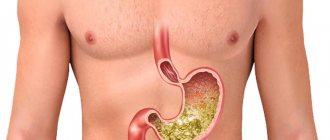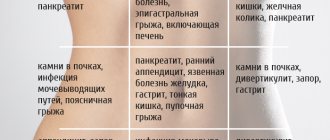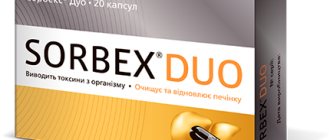There are times when our stomachs growl and we wonder why this is happening? While this sound isn't as socially stigmatized as, say, gas, when your stomach starts acting like a whale in the middle of a meeting or date, it's not very pleasant.
Loud rumbling in the stomach causes a person a lot of discomfort and trouble. The noisy digestive process makes itself felt at the wrong moment, especially often during times of psychological stress. This usually happens when you need to focus your efforts on an important task - an important exam, a presentation, a speech at a work meeting.
What is a rumbling stomach?
Bubbling or rumbling, not aggravated by additional manifestations, is a normal physiological process in which the intestinal muscles contract when gases or water are present.
Sounds of this nature are made constantly. However, in a healthy digestive tract, they are practically inaudible.
If the rumbling is strong, then this indicates a significant accumulation of gases, which is already a consequence of improper functioning of the intestines or other organs of the gastrointestinal tract, which provoke such a malfunction.
Help the pancreas
We found that the cause of heaviness in the abdomen may be due to a lack of digestive enzymes. And this can manifest itself even with proper nutrition. In order to restore the amount of enzymes, there are special preparations, they are called enzyme preparations. Their task is to deliver the missing enzymes from the outside to support digestion.
Creon® has many years of expertise in digestive support. The active ingredient pancreatin is a source of additional enzymes for digestion. In fact, most existing enzyme preparations contain pancreatin. But it's not that simple. The body dictates to us additional conditions under which the drug can help most effectively.
The main requirement is particle size. Thus, scientists have found that the smaller they are, the more effective the means1,4 are to mix with food in the stomach in order to help digest its maximum volume.
Besides, working in the stomach is only half the battle. The drug must enter the intestines. Mixed evenly with food, it is not difficult for small particles.
Creon® is produced in the form of minimicrospheres - small particles of pancreatin, which are placed in a capsule3. Following the physiological path of food, Creon® 10000 is integrated into the natural process of digestion and helps to cope with heaviness after eating, seething, and discomfort2,3. Learn more about how Creon® works.
If necessary, the capsule can be opened and the particles mixed with food3. There is no need to be afraid, because... Each particle has a protective shell from the destructive environment of the stomach.
It is important that when taking Creon® the body does not stop digesting food itself; the drug only supplements its own digestion2. Therefore, Creon® 10000 can be taken every time it is needed. The high safety profile allows its use even in newborns3.
Why does your stomach growl: reasons
Too active peristalsis of the stomach and intestines can be a warning sign. Let's figure out why your stomach is rumbling.
Hunger and rumbling in the stomach are eternal companions
When the stomach feels “as if empty,” a person always hears its rumbling. This phenomenon occurs due to the migrating motor complex. This process develops if food has not entered the stomach for 2 or more hours.
Against the background of this phenomenon, loud sounds arise. For the functioning of the digestive system, the migrating motor complex is a common phenomenon. With its help, the intestines and stomach are cleansed. Sometimes the motor complex may not work well enough, so a person experiences nausea and pain in the abdomen.
Dysbacteriosis
Sounds that confuse you may indicate an intestinal disorder and a deficiency of beneficial bacteria. Dysbacteriosis, in turn, appears for various reasons, including due to uncontrolled use of antibiotics, poor diet and stress.
Binge eating
Sometimes after eating your stomach rumbles even with a moderate diet, but if you overeat, the rumble will be much stronger. Excess food overloads the gastrointestinal tract, which leads to impaired peristalsis.
What is the “singing” belly trying to say?
By the volume and frequency of the sound, you can determine what exactly the intestines lack2:
- It rumbles and seethes strongly - additional substances are required for proper and stable digestion of food, and enzyme deficiency develops.
- In addition to sounds, there is bloating and high gas formation - there is definitely flatulence, pancreatitis or intestinal diseases are probably developing.
- Constant rumbling is a violation of the absorption functions of the gastrointestinal tract.
- Rumbling and pain - inflammatory processes develop in the stomach or intestines.
- A series of sounds and gurgling indicates an excess of fluid in the stomach and a violation of absorption functions.
In addition, rumbling can signal specific diseases depending on the time of day, body position and location of the sound2:
- Rumbling in the morning, during breakfast - possible disturbances in the functioning of the gallbladder2.
- Rumbling at night – weakened gastrointestinal motility3.
- Lying on your back - intestinal function is disrupted3.
- Lying on the right side – diseases of the biliary tract2.
- Lying on the left side – problems with the pancreas or sigmoid colon2.
- Rumbling in the left side of the abdomen is a lack of enzymes2.
- Rumbling on the right side of the abdomen – diseases of the biliary tract2.
- Rumbling in the lower abdomen is a malfunction of the large intestine2.
The rumbling itself does not carry a threat. Getting rid of the causes will help reduce the “volume” of the rumbling. Also, rumbling may be the first recognized signal that not everything is in order in the body. It's time to find out what causes rumbling exist and whether there are serious diseases among them.
If it rumbles at night, what is it?
Are you bothered by noise at night? There are several reasons: There was probably a long break between dinner and bedtime. This is not dangerous.
- If rumbling is observed sometimes, then pay attention to the amount of food eaten at night.
- The stomach has difficulty digesting what it eats, so it reminds you of it by loud rumbling.
- If noises occur when you lie on your left side, then most likely you have gastritis.
- In case of strong excitement or stress, sounds will also be heard on the left.
- Night rumbling may also indicate the presence of colitis, pancreatitis, and dysbacteriosis. Symptoms can be controlled if treatment is started immediately.
When you need to see a doctor urgently
Most often, borborygmas are harmless and only cause psychological suffering. But there are symptoms of Abdominal sounds / US National Library of Medicine, in which it is necessary to complain about rumbling to a therapist or gastroenterologist. Here they are:
- You notice streaks of blood in the stool.
- Rumbling is accompanied by painful cramps in the abdomen.
- In addition to borborygmas, nausea and vomiting are present.
- Your stomach is actively rumbling for several hours in a row, and all this time you continue to have constipation or diarrhea.
It is also worth talking to your doctor if irritating sounds are coming from your intestines day after day. In this case, it is necessary to exclude possible diseases of the gastrointestinal tract and metabolism.
Stomach growls - what to do?
First of all, there is no need to be embarrassed because it happens to everyone. But sometimes it is necessary to avoid awkward sounds during an important event or meeting. We'll tell you how to stop your stomach from growling.
- Drink some water. This will improve intestinal motility and calm it. But don’t overdo it—too much liquid can have the opposite effect and your stomach will begin to gurgle even louder.
- Have a snack. To avoid a hungry stomach growling, carry a light snack with you made from foods that do not cause gas, such as vegetable chips or natural yogurt.
- Take probiotics. If your stomach is constantly rumbling, you should take a course of special medications and regularly consume foods that increase the number of beneficial bacteria in the intestines - cheese, yogurt, sauerkraut, kombucha.
- Control your hunger. Since an empty stomach growls louder than its full counterpart, try eating smaller portions, but more often. Or choose a healthy snack (a handful of nuts or an energy bar).
- Conquer stress. We've already said that your stomach gets nervous along with you, so if you're struggling with a constant rumbling stomach, why not take advantage of our stress management tips? Moreover, as a bonus, your overall well-being will improve.
- Take a walk after eating. Research from the University of Mannheim has shown that walking immediately after eating, even a fairly short 15-minute walk, can significantly speed up gastric emptying and therefore reduce the risk of awkward noises.
Normally, rumbling is constantly present in the stomach, only its severity varies. But if it is absent, this is a signal to action. Emergency medical attention may be required.
How does this happen?
Seething in the stomach can appear from drinking a large amount of liquid or the formation of gases from carbonated drinks. In addition, if you drink a glass of ice water on an empty stomach, it may begin to actively contract, which will also lead to rumbling in the stomach.
With every meal we swallow air and, if there is a lot of it in the stomach, we can also hear bubbling. It’s unpleasant when added to this is heaviness in the stomach. Bubbling, rumbling and heaviness may appear after eating in certain situations.
- Large meals . When you relax at dinner and lose your vigilance, it is so easy to eat too much. You don’t want to strain your willpower, and even less so to leave the last tasty piece on the plate. In addition to routine, small overeating, there are holidays. Often we know that overeating is inevitable. Some prepare by taking enzyme preparations, while others eat specially in advance to reduce their appetite. And some people think it’s right to come to visit hungry in order to test their digestive abilities.
- Fatty heavy meals . Most fast food contains a lot of hidden fats and fast carbohydrates. But during the day we have no alternative when we need to eat quickly and better on the go.
- Large pieces . In a hurry, trying to eat everything faster, we can swallow our lunch like a boa constrictor. But we don’t have time to lie in the shade and digest food. Often at work meetings and trainings, lunch is served in a buffet format, and the time allocated for lunch is limited. This is how the habit of eating without chewing food is often developed.
- Bad habits . When smoking, air is swallowed, especially if it is combined with food. Alcohol, a frequent companion to feasts and holidays, aggravates the situation.
Give up all of the above at once? Perhaps, by eliminating the cause, you will be able to get rid of the heaviness in your stomach and seething after eating, and then you will not have to deprive yourself of all the joys of life.
Diagnostics
To identify the cause of abdominal pain, it is recommended to undergo a comprehensive examination , including the following diagnostic procedures:
- Endoscopic examination of the intestines (colonoscopy or capsule endoscopy). This procedure allows you to assess the condition of the intestinal mucosa, identify benign and malignant neoplasms, polyps, erosions, ulcers and inflammatory changes.
- Plain radiography of the abdominal cavity.
- Survey ultrasound of the abdominal organs.
- Biochemical blood test.
- General clinical blood test.
- Analysis of feces for helminthiasis.
- Coprogram.
Diagnosis of intestinal dysbiosis includes examining stool for dysbiosis, which in 70% of cases leads to increased gas formation in the intestines.
Recommendations
- Eat more dairy products . The best choices are fermented milk products made from natural milk, such as kefir, and fermented vegetables. You can also make your own fermented vegetables using a special starter that contains strains of bacteria that produce high levels of vitamin K2 . This is especially important if you are taking vitamin D3 supplements.
2. Do not use antibiotics unless absolutely necessary . But if you are forced to use antibiotics. Then be sure to supplement your diet with fermented vegetables and/or probiotic supplements.
3. Take probiotics . However, it is best if the beneficial microflora comes with food and supports its growth with the help of prebiotics.
4. Limit the amount of meat products in your diet . It is widely known that most animal products contain antibiotics, pesticides from plant feed, especially from GMO grain crops, the growth of which is supported by the famous pesticide Glyphosate.
5. Maintain healthy levels of dietary fiber in your diet by getting it from vegetables, nuts and grain seeds.
6. Try not to use chlorinated or fluoridated water for drinking . It is better if your water is filtered at home.
7. The more the merrier, reduce in your diet foods with sugars and additives that either enhance pathogenic flora or suppress the growth of beneficial bacteria. Such substances include food emulsifiers such as polysorbate 80, lecithin, carrageenan and xanthan gum.
8. Don't be too clean when working in the garden. The fact is that, according to a scientific hypothesis, the entry of various viruses and bacteria into the body through dirty hands contributes to “natural vaccination” and strengthening the immune response for many years.
9. Stay outside the house as much as possible , and open the windows in the house as often . The fact is that the entire history of mankind took place outside of modern apartments and houses, and people were close to nature. Today we spend about 90% of our time indoors, therefore, open windows allow many bacteria to enter the room, which contribute to the diversity of our microflora.
10. Wash dishes by hand rather than using dishwashers. Recent studies have shown that the use of hot washing in cars helps to destroy almost all bacteria. And sterile dishes, preventing the body from exercising, leads to frequent allergies.
11. Do not use antibacterial soap , which is saturated with various types of antibiotics, which contributes to the development of resistance of microbes in your body to such antibiotics and can subsequently lead to serious bacterial diseases.
Information sources
- www.ncbi.nlm.nih.g
- www.scientificamerican.com
- www.hindawi.com
- www.ncbi.nlm.nih.gov
The information on this site has not been evaluated by any medical organization. We do not seek to diagnose or treat any disease. The information on the site is provided for educational purposes only. You should consult your physician before acting on information from this site, especially if you are pregnant, nursing, taking medications, or have any medical condition.
Rate this article
Average 5 Total votes (1)
Pregnancy
During pregnancy, the body undergoes restructuring. An increase in progesterone helps relax the muscles of the internal organs, and the development of the fetus leads to a change in position and compression of the internal organs. Pregnancy also affects metabolic processes. All this contributes to the accumulation of gases and makes it difficult to remove them.
Dear patients! Remember that only a qualified doctor can make an accurate diagnosis, determine the causes and nature of the disease, and prescribe effective treatment. You can make an appointment with our specialists or call a doctor at home by calling 8-(4822)-33-00-33
Be healthy and happy!
Treatment of children of different age groups
Treatment methods for the disease depend on age. Diet, medication, and lifestyle changes may be indicated.
What help can be provided for intestinal flatulence in an infant?
First aid for flatulence in children involves alleviating the condition. A decoction of chamomile and “No-spa” (drotaverine hydrochloride) will help relieve intestinal spasms and ease colic. You can stimulate the passage of gases with the help of Espumisan.
Important! Children under three years of age should not be given medications that have not been approved by the supervising pediatrician.
can be placed on the baby's stomach . Massage is also used to relieve discomfort: circular movements without pressure in a clockwise direction. The child's condition can be alleviated by placing him on his back and bending his legs several times, each time bending them towards his stomach and straightening them. Source: A.N. Surkov, V.V. Chernikov Symptom of flatulence in young children: causes and ways of correction // Pediatric pharmacology, 2013, v. 10, no. 1, pp. 78-82
If these measures do not help, a special gas outlet catheter can be used.
A nursing mother should be careful when consuming gas-forming foods - legumes, cocoa, coffee, chocolate, sauerkraut, baked goods, muffins, grapes, fresh vegetables and fruits.
After each feeding, you need to hold the baby upright so that excess air comes out with a burp.
You can use any medications only as prescribed by a doctor. This could be Espumisan, enterosorbents, eubiotics.
Treatment of older children
In some cases, digestive enzymes are prescribed in tablets. Changes are made to the diet, from which harmful foods are excluded: carbonated drinks, chips, legumes, potatoes, raw vegetables and fruits, chocolate, cocoa. It is important that the child does not overeat. To relieve spasms, improve motility and increase the tone of the intestinal walls, the doctor may prescribe a special drug, for example Iberogast.
It is imperative to observe what the child eats to determine what food causes bloating. Food should be steamed or boiled, and its temperature when served should be moderate. It is recommended to drink more - still water, herbal decoctions. You need to eat 4-6 times a day in small portions and chew your food thoroughly.
Authorized products:
- low fat cheeses;
- dairy products;
- lean fish;
- porridge without milk;
- rabbit meat, poultry;
- pumpkin, beets;
- egg dishes (not fried).
The child should move more, walk, play with peers. It is important to protect him from stress.








